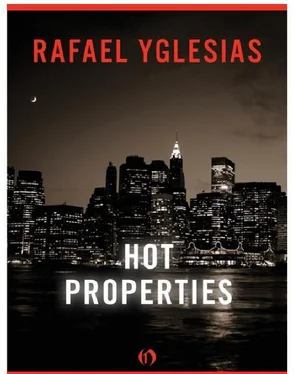“You’ll do a great job,” he urged. “You’re perfect for it.”
“Thank you,” David said.
“I’m going to leave my wife.” Gelb pursed his lips. He stared off at the Hudson River, squinting at the gray water, the hard impenetrable surface looking like liquid steel boiling beside Manhattan. They were meeting in Riverside Park in the late afternoon at his request. She hadn’t seen him for two months. She had called off their affair at the worst possible time (from the point of view of her novel’s success). Indeed, she assumed it had hurt her book already. Fred Tatter had gotten a book-club deal, his first printing was four times the size of hers — obviously it was Garlands big first-novel of the season. Betty hadn’t even gotten an assurance of a single dollar to run an ad for Patty’s novel, though she claimed Patty had had just as good a shot at the book clubs.
“They make an objective choice, Patty,” Betty argued. “They read the books. The publisher doesn’t get to pick who’s a book-club selection.”
“Come on! If they know the publisher is pushing a book, they pay attention. Who are you kidding? I was Gelb’s assistant! He had those people hopping for weeks ahead of time! One word from him and I’d be dead, and you know it.”
“I don’t think he’d do that. He’s not angry at you. He under—”
“Have you talked to him about it?”
“Of course not!”
“Then how do you know whether he’s angry!”
Betty lectured her then, saying that she had to calm down or she’d be dead by the time her novel came out. “It’s not going to be a bestseller, Patty. You have to face that.”
“And Fred’s is? That piece of shit!”
“You’ve read it?” Betty sounded surprised.
“Of course I haven’t read it,” Patty said, laughing. “But it has to be a piece of shit.”
Betty laughed. “It is,” she said, and laughed harder. “But it’s shit that moves,” she added.
“Really,” Patty said, dismayed. “I can’t believe Fred Tatter is going to have a best selling novel.”
“I didn’t say it was going to be a bestseller, for God’s sake,” Betty protested. “It’ll do well. Anyway, what do you care? What’s the point?”
“I should have had an affair with him!” Patty cried out. “He at least would give me a blurb.”
Betty roared with laughter. “You’re terrible.”
“Why can’t I do anything right!” she screamed, only half-serious.
“Your book is wonderful. You have a great career ahead of you. What are you so desperate about?”
She didn’t want to explain herself to Betty, tell her that she couldn’t go on living with David. She apologized for her hysterics and went on feeling desperate. She had broken up with Gelb so she could give their relationship a chance. But it seemed dead. David never fucked her. Indeed, on some days he shrank from her touch guiltily. She wondered at times whether he was having an affair, his manner was so distant and worried. But he had no time to: he worked at the magazine sixty hours a week (she knew he was really there); and the rest of the time he sulked in the loft reading and watching television. She wanted out of their life together. But if her novel didn’t make money, she couldn’t afford to leave without getting a job, and that meant the end of her writing. She loathed herself for her weakness, her dread of being alone in the world, but she couldn’t break free of it. So when Gelb called and begged, literally, to see her for an hour, she agreed.
“I’m going to leave my wife,” he said. She watched his profile after this opening shot. He had his chin in the air, bravely, his full cheeks darkening with stubble — he looked like a weary victorious general gazing over the cost of his triumph. He glanced at her after a long silence. “Well?” he said.
“How come?” she asked.
He snorted. “You know why.”
“Because of me?”
“Yes.”
“We haven’t seen each other for two months,” Patty protested. “You hate my guts.”
“No I don’t.”
“You said you did.”
“I was angry! You broke up with me. Don’t tease it out of me. I love you. I’ve missed you horribly. I tried to hate you. I can’t. I tried to convince myself you were just an opportunistic bitch—”
“I am,” she interrupted.
“I don’t care. That’s what I’ve come up with. I don’t care what your motives are. I want you. If I”—he nodded toward the monolithic Riverside Drive buildings that stood like mute gods frowning down on the dull oppressed river— “have to divorce and lose my kids, I will.”
“Jesus!” Patty turned away. She felt tears in her eyes. “Great! If we destroy your children’s lives I can have you.” She began to walk, the broad space of the sky scaring her. The river’s motion nauseated her. She walked quickly away. She heard him run behind her. She expected him to grab her, but he only moved in front, blocking her path.
“I don’t mean it that way. I don’t like admitting I’m beaten — that I need you. I’ll see my kids as much as I ever have. Even if you say no, I’ll leave her. I can’t stand living there. She’s miserable, and I’ve gone from being bored by her to hating her. I have to get out. It has nothing to do with you.”
She was crying. The damn tears were coming out of her and she had no idea why. She felt acutely nervous. Her breath was short. Gelb seemed so big and awkward, looming over her as though he were another of Riverside Drive’s buildings, his words cold and restless like the river: she skidded on its slick surface waiting to drown. She couldn’t love him — being with him never felt wholesome; sometimes thrilling, often morally disgusting, but never simple and pleasant.
Gelb tentatively put his arms out, coaxing her to him. “You’re so beautiful. You’re so great to be with. I can’t stop thinking about you — you have to say yes. I love you. I don’t think I’ve ever been in love before—”
“Shut up,” Patty said while blubbering into his chest. “I can’t take this. I’m not strong enough.” She tried to pull away, but he stopped her, effortlessly, with one hand. She felt so weak pulling against him. She was stuck out there in deep water, helpless against his invisible relentless undertow. The memory of the peace of the shore had faded— there was only this water rising up to choke her, while below she was steadily seduced out into the overwhelming ocean.
She wanted fame. She wanted money. She wanted power: to strengthen her, to allow her to break the iron grip of his fingers with an easy gesture. Either that — or surrender: to stop the pathetic flailing of her arms and let the drowning come, fill her ears and nose and mouth with their oppressive demands and possession. “What do you want me to say?” she pleaded, sobbing. “What am I supposed to say? I love you! I love you!” she shouted. “Is that enough?”
She saw a face clearly. It belonged to a middle-aged woman, twenty feet away, walking a white terrier. She looked at Patty with horror and longing in her eyes, as though she were empathetically feeling each of her emotions. When they made contact with their eyes, the woman looked down at the dog.
Gelb suddenly became yielding. He hugged her, whispering, “It’s all right, it’s all right. You don’t have to say anything. I’m sorry. I’ve put too much pressure on you. I just wanted to tell you how I felt. You don’t have to respond.”
She trembled in his arms. He held her for a while, rubbing her shoulders and back as though drying her after a dip in the ocean. When she stopped shivering she leaned her head against his chest and felt sleepy. She could close her eyes and rest there, let him make the decisions and move her through life, abandoning thought, effort, and will.
Читать дальше












